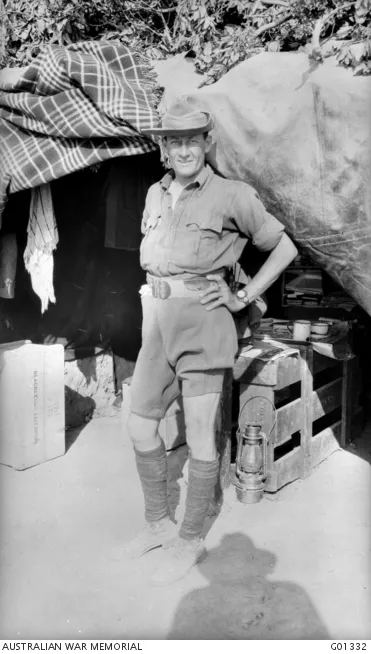Oliver Hogue
‘[Oliver Hogue was] a man who radiated geniality, and in all his doings was actuated by a kindliness of heart and generosity that won everyone’s regard and affection … Fearless, cool, and brave, he was in many ways a typical soldier. He was a soldier and a gentleman. Unfailing goodness was a quality he possessed in a marked degree.’
– Sydney Morning Herald, 12 Mar. 1919, p. 10
Born in Sydney in 1880, Oliver Hogue considered himself a bushman and horseman rather than a man of the thronging city. Perhaps it was this adventurous spirit that made him a commercial traveller before becoming a journalist with the Sydney Morning Herald in 1907.
Oliver enlisted in the AIF in Sydney on 16 September 1914. He was unsuccessful in his bid to become Australia’s official war correspondent, a role that went to Charles Bean. Trooper Oliver Hogue joined the 6th Light Horse Regiment and departed Sydney in December on HMAT Suevic.
Oliver fought for five months at Gallipoli, promoted to lieutenant on 1 May 1915. Like many at Gallipoli, he became sick with enteric fever; he was transferred to the 3rd London General Hospital for treatment in October 1915.
He returned to the Middle East in early 1916, fighting at Romani before being transferred to the Imperial Camel Corps. In mid-1918, he was transferred to the 14th Light Horse Regiment, by which time he had been promoted to major. During his service, the loyal and fearless soldier wrote pieces that were published in the Sydney Morning Herald under the pseudonym ‘Trooper Bluegum’.
He returned to England in late February 1919, this time ‘dangerously ill’ with influenza. He died at the 3rd London General Hospital on 3 March. (In total, the Spanish flu pandemic claimed some 21 million lives globally.) Oliver Hogue was buried in the Australian Military Burial Ground at Brookwood, England, aged 38.
